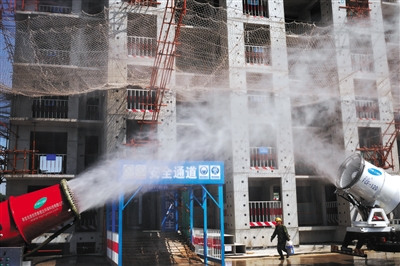 A multi-functional mist-generation machine sprays water over rising dust from a building site in the Chaoyang District's Dongba area, May 10, 2016. (File photo/Beijing News) Environmental chiefs have punished officials in two cities for using mist cannons - devices for clearing smog - to wash pollutants from monitoring stations to improve air quality readings. The large cannons, usually mounted on trucks, spray a mist of liquid to disperse fine airborne particles. Many cities, including Beijing, now use them to reduce air pollution over a small-scale area. However, officials in Xinyu, Jiangxi province, have been criticized for deploying the devices to clear the air around an environmental monitoring station in September and October. "The government leaders in that area felt great pressure about the air quality assessment, so they decided to use this method to lower the monitoring data for a better result," the Ministry of Environmental Protection said on Sunday. A similar situation was discovered in Xinyang, Henan province, during the same two months. Some cities have failed to build effective systems to prevent and control such illegal behavior, to ensure the monitoring data is free of interference from governments and individuals, the ministry said. Reports show the heads of environmental protection in both cities have been punished, including being ordered to make a public self-criticism, while the drivers of the trucks carrying the cannons have been fired. "It's illegal to interfere with air quality monitoring, whether these vehicles were assigned to do it on purpose or not," the ministry quoted an unnamed environmental monitoring official as saying on Sunday. "City governments and their environmental protection authorities are required to make thorough inspections to avoid interference as well as encourage public supervision," the official said. Falsifying monitoring data is an environmental crime in China, according to a judicial interpretation of the Criminal Law that went into effect on Jan 1, 2017. "It's the first time such an act has been made punishable as a crime, which means offenders can be criminally prosecuted and face tougher penalties," said Ma Yong, an environmental law researcher for the Supreme People's Court. In addition to protecting the integrity of monitoring data to get a clear picture of the pollution situation, the ministry has conducted strict field inspections to find violations, especially during periods of heavy smog. Inspectors have visited 2,125 locations in 28 major cities in northern China since the area was blanketed by smog on Friday, including Beijing and Tianjin. They discovered violations at 21 companies, including the excessive discharge of pollutants, the ministry said on Sunday. |
Powered by Discuz! X3.4
© 2001-2013 Comsenz Inc.